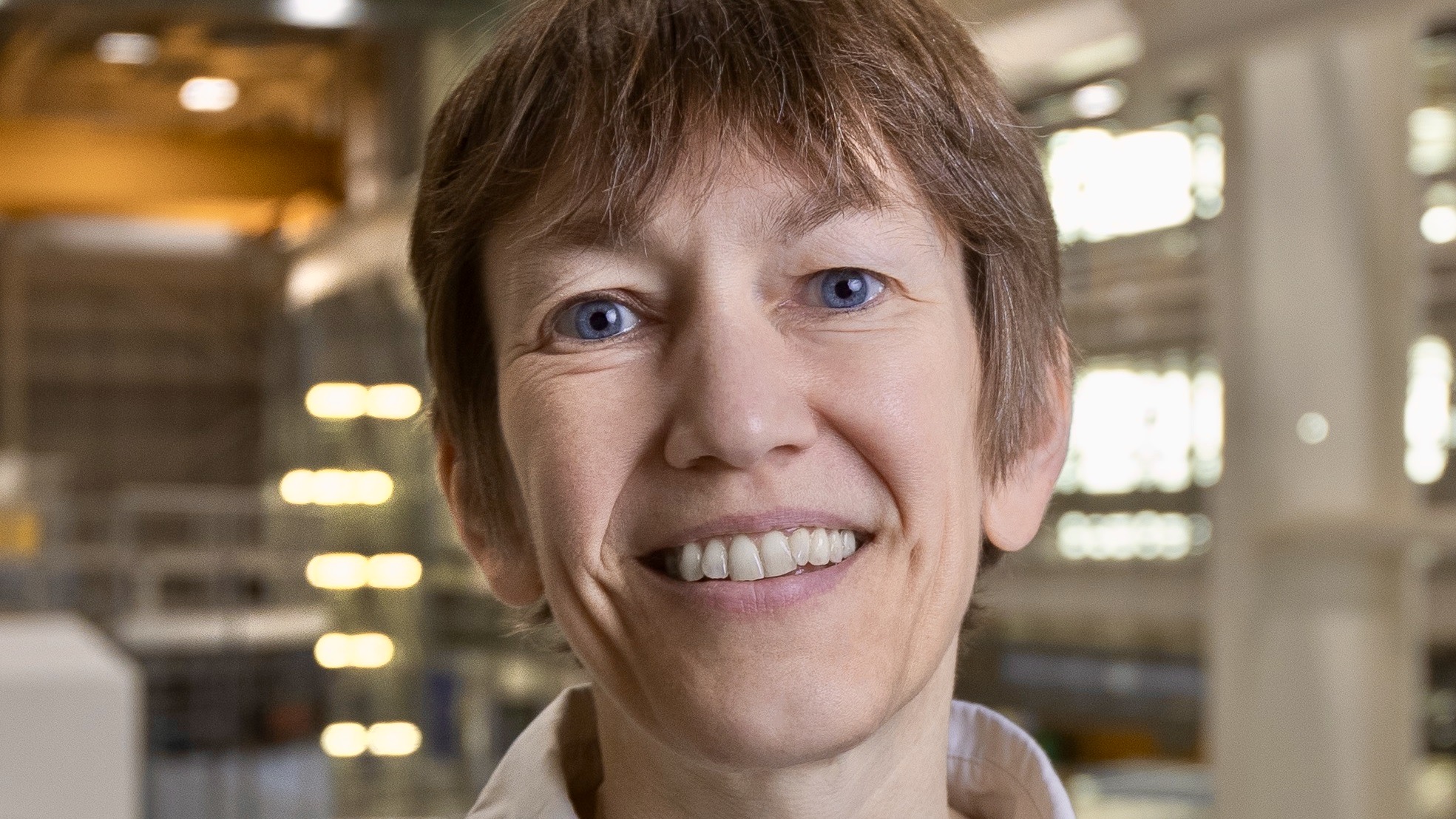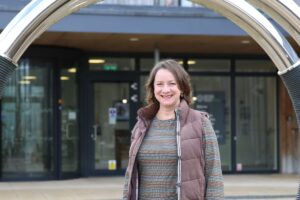A school visit from The Oxford Trust changed Professor Jacqui Cole’s Life
March 8, 2022

Professor Jacqui Cole is Head of Molecular Engineering at Cambridge, and the BASF/Royal Academy of Engineering Research Chair in Data-driven Molecular Engineering of Functional Materials, and a joint appointment with the ISIS neutron and Muon Source. Her highly interdisciplinary research combines artificial intelligence with data science, computational methods and experimental research to realise a ‘design-to-device’ pipeline for data-driven materials discovery. Jacqui holds two PhDs – one in Physics from the University of Cambridge and one in Chemistry from the University of Durham – but she’s anything but the traditional academic.
Jacqui grew up in Grove and then Witney, Oxfordshire, a few miles from where the ISIS Neutron and Muon Source is located. After GCSEs at the age of 16, she left Wood Green School in Witney and got a job at a local warehousing and transportation company as a hand packer. “It was just what I thought people did,” she says, “Leave school, get a job, work your way up.”
Then she got a phone call from the school, asking if she was coming in to get her GCSE results. Slightly surprised, she did, and was asked if, given her grades, she would commit to doing A-levels. She studied Maths, Physics, Chemistry and History but, hedging her bets, didn’t leave her packaging job.
Back at school, there was a visit from The Oxford Trust, a local charity with a mission is to encourage the pursuit of science and enterprise. Led by Gillian Pearson, Director of Education for the Trust, the charity’s education programmes aimed to engage the next generation of scientists. It was this visit that changed Jacqui’s life.
“I picked up a flier they left for a competition,” she says, “You had to choose a local technical company, visit them and write a report on the company.” She chose Oxford Lasers, “because I thought it sounded cool!” The prize was an all-expenses paid trip to the British Science Association Festival of Science, that year hosted by Swansea University. It was an eye-opener. “I just had no concept of university or what it was like,” she says. She went to lectures, which she enjoyed, but particularly recalls the time between lectures having lunch on the university lawns by the beach! Back at school, she decided to give university a go.
Liking the college approach and the small city, her first choice was to study Chemistry at Durham. She enjoyed the course, but the highlight was a final year research project studying crystals. “I was really excited by the discovery side, seeing these structures for the first time, and the whole concept of being able to see atoms in place.”
This made Jacqui determined to do a PhD and she applied to Durham and the Institut Laue Langevin (ILL), a neutron source based in Grenoble, France. On finishing, she then found a post in Kent researching optical materials – similar to the research she’d started in her PhD. She says, “I realised I really like both the discovery side of research and the analytics, and just seeing the patterns emerge. I also love the idea of seeing something entirely new, but also being the world expert, even if it’s only in a really niche area. And I just love the idea that you can see actual atoms, that’s really cool!”
One difference in her role at Kent was that she was now working in a Physics department rather than Chemistry. “I was working with a lot of physicists and they had a much more mathematical approach. I felt it would be useful to up my game, so I started taking some Maths modules with the Open University.”
This continued from her two-year PostDoc to her next post, a Junior Research Fellow at the University of Cambridge, putting in a proposal to develop photo-crystallography – applying light to molecules within materials to determine crystal structures and how the light affected them. “It was very early days,” she says, “and a lot didn’t work! But I now had a Royal Society University Research Fellowship to continue that research over a longer time frame, I had extra resource to buy kit, and it also meant I was able to take on two PhD students.” As if that wasn’t enough to contend with, she also started a PhD in Physics at Cambridge, expanding on the work she had done in her PostDoc; on top of more Open University modules, which would lead to an Engineering degree, specialising in artificial intelligence (AI).
Cambridge became Jacqui’s spiritual home, and over the years she has grown her own interests in data-driven materials discovery, leads a group of 26 students and has an impressive list of awards to her name! She took up a joint appointment with ISIS, as she carried out many experiments there, and in 2018 the Royal Academy of Engineering awarded her a five-year Fellowship under their Research Chair and Senior Research Fellowship scheme.
Her unconventional start to academic life has continued throughout her career. “I’ve never really had a plan,” she says, “I have just gone with what I liked, although, I have also been very lucky in chance encounters and I have also had some amazing mentors!” This had made her determined to pay this support forwards to the next generation of scientists.
“I really enjoy combining the research I do at ISIS I and my academic role. University is important to me because I am training students, it’s really important to encourage the next generation, and I made a conscious effort to build a very diverse international group. I’ve been lucky, but I want to ensure everyone has similar choices. I owe it to my students – they put their faith in me and I have a responsibility to deliver.”
Jacqui’s current research aims to provide a data-driven approach to materials discovery, finding ways to use molecular-level knowledge to address 21st century challenges. She applies the latest advances in AI to systematically predict new chemical materials tailored to a given application, primarily in solar cells, magnetic devices and catalysts. Lead candidates from these materials are then validated experimentally, combining multiple techniques carried out at ISIS, the Central Laser Facility, Diamond Light Source and the Research Complex at Harwell.
Jacqui says, “This is a unique opportunity to collaborate with STFC, industry and academia to discover new materials which can help us with today’s grand challenges in engineering, using advanced data science methods.”
However, she is clear that tackling these challenges is about more than the technology, it’s about the people. “I feel that I have a responsibility to influence where I can, to make sure my own research group have the right training and have the right outlook on the world. I will always stand up for those who are disadvantaged. I believe that if you are given authority, you should use it to educate – in this case, about opportunities for all.”
What do we say our mission is? Encouraging the pursuit of science and enterprise. And it all started with a school visit from The Oxford Trust.
Article with thanks from Sara Fletcher, Head of Impact & Engagement, ISIS Neutron & Muon Source



